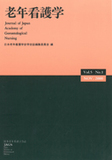Japanese
English
- 販売していません
- Abstract 文献概要
- 参考文献 Reference
在宅痴呆性高齢者(DSM-ⅣによるADもしくはVD)23名を研究対象(無作為割付により介入群12名,対照群11名)として,回想法を取り入れたグループケアプログラムによる介入を実施し,効果を検証した結果,1)対象全体の認知機能(MMSE)への効果では,見当識の領域を中心として,介入群と対照群との間に有意差を認め,介入群では対照群に比して有意に改善した.2)対象全体の日常生活機能(MOSES)への効果では,失見当識と引きこもり傾向の領域について,介入群と対照群との間に有意差を認め,介入群では対照群に比して有意に改善した.3)グループセッションならびに経過評価から,介入群に対人交流の向上や意欲の改善が示唆された.以上より,回想法を取り入れたグループケアプログラムによる介入は,痴呆性高齢者の認知機能ならびに日常生活機能の改善と対人交流や意欲の向上に対して有効であり,地域(在宅)痴呆性高齢者に対する日常生活適応促進に向けての有効な一方策となる可能性が示唆された.
The purpose of this study was to examine the effects of an intervention of group care program consisting of reminiscence to prevent the decline of cognitive function and daily living activities in the community elderly with dementia (Dementia of the Alzheimer type or Vascular Dementia according to DSM-Ⅳ). Subjects were randomly assigned to either intervention group or control one. For the intervention group, a group care program was provided, on the other hand, for the control one, the usual day care program was provided. As a result, 1) There was a significant difference in cognitive function between the intervention group and the control one, the total MMSE scores and orientation score in the intervention group increased, while that of the control one decreased. 2) There were significant differences in disorientation and withdrawal between the two groups, the intervention group showed improved these function, while the control one showed a loss of function. 3) The group process review suggested that the improvement of inter-personal relationship and vitality were seen in the intervention group. Judging from the results, We conclude that the group care program consisting of reminiscence can be effective for improving cognitive function and daily living activities on community elderly with dementia.
Copyright © 2000, Japan Academy of Gerontological Nursing All rights reserved.


